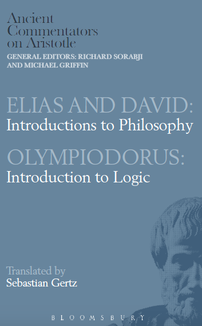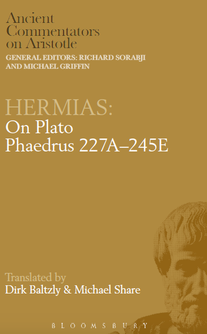| We are pleased to announce two new volumes currently in press and hopefully in print in early 2018. These are: Elias and David, Introductions to Philosophy, with Olympiodorus, Introduction to Logic, translated by Sebastian Gertz Ammonius (445-517/26 AD) set up a new teaching programme in Alexandria with up to six introductions to the philosophy curriculum, which made it far more accessible, and encouraged its spread from Greek to other cultures. From Olympiodorus, his pupil, we have an introduction to Aristotle’s Philosophy, an introduction to Logic and an introduction to Aristotle’s Categories. Olympiodorus’ students, Elias and David, both wrote introductions to Philosophy, which start with six definitions of Philosophy, to which David adds replies to the sceptical question whether there is such a thing as Philosophy. All these are translated here. From Ammonius we have an Introduction to Logic, to Aristotle’s Philosophy, and to Aristotle’s Categories, all translated earlier as the prooemium to Ammonius’ commentary on Aristotle’s Categories. Ammonius also wrote a commentary on an earlier introduction, Porphyry’s Isagoge (Introduction), and prefaced this with a further introduction. If we count in Porphyry’s Introduction itself, which has been translated elsewhere, this makes six introductions to the Philosophy curriculum. The texts translated by Sebastian Gertz go a long way towards completing our picture of what it would have been like to sit in a first year Philosophy course in Ancient Alexandria. Hermias, On Plato Phaedrus 227A-245E, translated by Dirk Baltzly & Michael Share This commentary records, through notes taken by Hermias, Syrianus’ seminar on Plato’s Phaedrus, one of the world’s most influential celebrations of erotic beauty and love. It is the only Neoplatonic commentary on Plato's Phaedrus to have survived in its entirety. Further interest comes from the recorded interventions by Syrianus’ pupils – including those by Proclus, his eventual successor as head of the Athenian school, who went on to teach Hermias’ father, Ammonius. The first of two volumes of Hermias’ commentary, the chapters translated here discuss the argument that the soul can be proved immortal as being the self-moving source of eternal motion. Aristotle explicitly disagreed with Plato on this treatment of the soul and Syrianus, having previously (in a commentary on the Metaphysics) criticised Aristotle severely when he disagreed with Plato, feels obliged here, too, to address the apparent disagreement. This new translation is thus vital for understanding Syrianus’ attitude to Aristotle. |
|
Comments are closed.
|
Archives
August 2022
Categories |


 RSS Feed
RSS Feed
